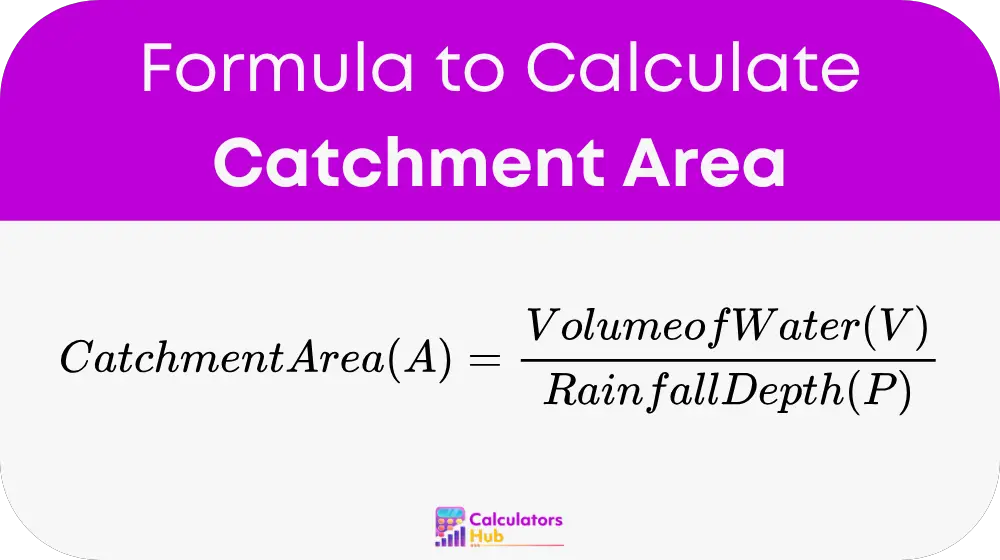The Catchment Area Calculator is a useful tool for environmental scientists, civil engineers, urban planners, and land developers. This calculator determines the area of land that collects rainfall and contributes to a water supply, such as a reservoir, pond, or aquifer. By assessing the relationship between the volume of water collected and the depth of rainfall, this tool aids in water resource management, flood risk assessment, and land use planning.
Understanding the catchment area is crucial for designing sustainable water management systems. It helps in predicting water availability, planning for irrigation, ensuring adequate water supply for communities, and managing runoff to minimize flooding and erosion. By using the Catchment Area Calculator, users can make informed decisions based on accurate data.
Formula of Catchment Area Calculator
The formula for calculating the catchment area is as follows:

where:
- Catchment Area (A) = The area of the catchment in square meters (m²) or square kilometers (km²).
- Volume of Water (V) = Total volume of water collected in the catchment area (in cubic meters, m³).
- Rainfall Depth (P) = Depth of rainfall over the catchment area (in meters, m).
This formula allows users to estimate the size of a catchment area based on specific rainfall events and water volume collected.
General Terms Table
The following table outlines key terms related to the Catchment Area Calculator, helping users understand important concepts without needing to perform constant calculations:
| Term | Definition |
|---|---|
| Catchment Area | The area of land that drains into a specific water body, contributing to its water supply. |
| Volume of Water | The total amount of water collected, measured in cubic meters (m³). |
| Rainfall Depth | The depth of rainfall over a defined period, measured in meters (m). |
| Water Resource Management | The planning and management of water resources to ensure sustainable supply and usage. |
| Runoff | The flow of water that occurs when excess water flows over the ground, often leading to erosion. |
Example of Catchment Area Calculator
For instance, if a catchment area collects a total volume of water equal to 500 m³ during a rainfall event, and the depth of the rainfall is measured at 0.2 m, the catchment area can be calculated as follows:
Catchment Area (A) = Volume of Water (V) / Rainfall Depth (P)
Plugging in the values:
A = 500 m³ / 0.2 m = 2500 m²
Thus, the catchment area is 2500 square meters, which can also be converted to 0.25 hectares for further land use planning.to collect the specified volume of water from the given rainfall depth.
Most Common FAQs
Understanding catchment areas is crucial for effective water resource management. It helps in predicting water availability, planning for irrigation, and managing stormwater runoff, which can reduce the risk of flooding and erosion.
To calculate the catchment area for your property, you will need to determine the volume of water collected during a rainfall event and the total depth of that rainfall. By using the formula provided, you can easily estimate the catchment area.
Yes, the Catchment Area Calculator can be used for any location, provided you have the necessary data on rainfall depth and the volume of water collected. This tool is applicable in urban planning, agriculture, and environmental conservation.